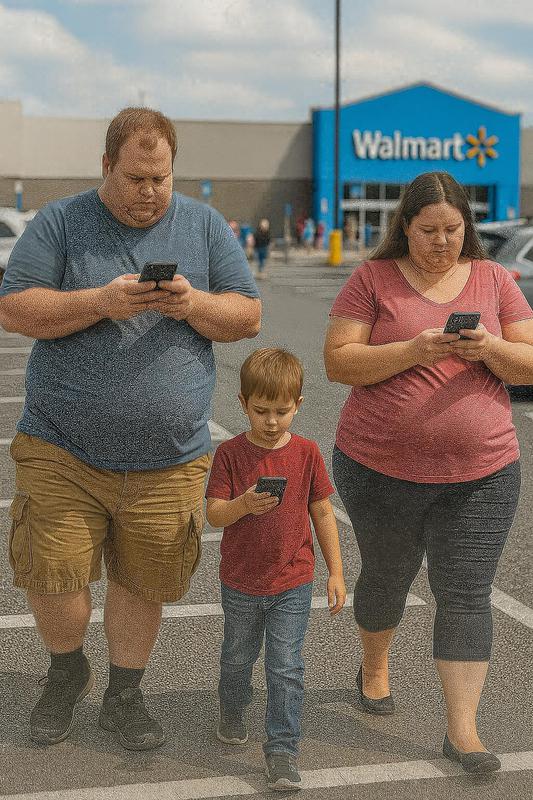"The Scroll: Genesis of Silence"
Conjured up by Martin B with a shit pile of help from an A.I. Robot that goes by the name of "Rhonda G. Blevins".
Based on an actual sighting in the parking lot of the Walmart in Guthrie, Oklahoma 7/5/25.
The names of the subjects have been changed to protect their identities. The picture was selected from Rhonda's AI "brain". As Martin could have taken his device out and snapped a photo without being noticed, it was better to do it this way.
It began in the parking lot of a Walmart.
Todd and Marlene Hutchins, both ordinary in every sense of the word, walked side by side without ever looking up. Each held a phone inches from their face, tapping, scrolling, pausing. Between them, their five-year-old son Milo copied them perfectly—his eyes glazed with the same screen glow, his small fingers already fluent in gestures he hadn’t yet learned to write.
There was no argument. No laughter. No spoken word. Just footsteps and silence—broken only by the soft click of thumbs on glass.
This was 2025, and no one yet understood that the Hutchins family wasn't just living their day—they were marking the beginning of an age. Not of violence, not of tyranny, but of slow mental erosion.
The Soft Collapse
What followed wasn’t dramatic. There were no bombs or revolutions. No artificial intelligence overlord. Just the gentle fading of thought.
People stopped remembering. There was no need to. Every fact, every number, every name was a second away in the digital ether. But without recall, there was no connection. No contemplation. No wisdom.
Conversation grew rare. People spoke less, texted more, then defaulted to emojis and short reactions. Language lost its complexity. Subtlety died. Sarcasm became offensive. Nuance became "too long, didn’t read."
By 2038, schools no longer taught writing by hand. By 2042, reading comprehension tests were simplified for clarity—then discarded altogether. "Contextual intelligence" was deemed unquantifiable and irrelevant.
Families of Silence
The Hutchins family aged quietly. They weren’t cruel or careless. They loved each other, in the way people do when conditioned not to express it aloud. Hugs were replaced by tags. Compliments became likes. Discipline came as automatic alerts from parental control apps.
Milo, now grown, had never heard a bedtime story from his father’s voice, only AI narrators with warm filters and soothing music. He never asked questions out loud. He whispered them to his phone.
By the time he had a son of his own, eye contact was considered invasive. Children wore headsets before they could walk. Playgrounds emptied. No one remembered the sound of kids laughing together—not digitally, but in real life.
Society Without Self
Governments didn’t fall. They just blurred. Bureaucracies became apps. Voting was replaced by sentiment tracking. The line between entertainment and governance faded completely. Everyone had access to infinite information, and yet no one knew anything.
Therapists were replaced by auto-generated affirmations. No one wanted to dig deep. Pain was inconvenient. Discomfort was obsolete. Grief became a disorder. Reflection became a glitch.
Eventually, history was flattened into an archive of trending moments. Philosophy was tagged as “outdated content.” Religion became a subscription tier. Death was sanitized—just another offboarding process.
The Legacy
Long after Todd and Marlene had passed, long after Milo’s generation had slipped quietly into apathy, a few archivists in distant outposts tried to piece together what had gone wrong.
They didn’t find a war. They found silence.
A silence that had grown, year by year, screen by screen, like a fog. And in the center of that silence, always, was the scroll—the unconscious motion that had replaced curiosity, dialogue, learning, and love.
The Hutchins family wasn’t at fault. They were simply first. First to forget. First to surrender to comfort. First to embody the future not as a tragedy, but as a choice quietly made and never questioned.
And that was how the human race began to end—not with noise, not with fire.
But with the gentle flick of a finger.
